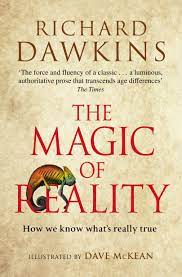Richard Dawkins. Character Assessment & Book Reviews by 'Rerevisionist'
These reviews have been separated from big-lies.org/reviews because that file is too large.
v. 8 August 2024Failures of Dawkins From articles on Jews (inserted June 2020)
Dawkins's Character, Worldview, Politics Dawkins' Politics, Family Tree | Charity Front Man | Typical Jew views
Book Reviews: with dates of first publication as printed within the volumes
The Selfish Gene: 30th Anniversary Edition First published 1976
River Out Of Eden: A Darwinian View Of Life 1995
Ancestor's Tale 2004
The God Delusion 2006. An accompanying 2006 TV film from UK's Channel 4 'Age of Reason' series, titled Richard Dawkins' The God Delusion © IWC Media Ltd has interviews including a US 'Pastor' and a 'Rabbi' which somewhat balances Dawkins' unhistorical view of the role of Judaism.
The Magic of Reality 2011
Appetite for Wonder 2013 Autobiography or 'Memoir' part 1
Failures of Clinton Richard Dawkins (1941 - ).
I find this a saddening thing to say: but all the evidence points to Dawkins being just another part of the crypto-Jew crowds taking the side of Jewish rubbish around the world. Read through the evidence; watch it pile up. There's nothing new about this situation, of course, though the pretence of science dates Dawkins to the recent few centuries, rather than the earlier pretence of innocence, backed by concealed collaborative force. At least he has some understanding of parasitism and of mutual academic back-patting.
Rae West 1 July 2018. Short note on the failures of Richard Dawkins. (His Appetite for Wonder gives his first names as Clinton Richard. His mother's name is given as Jean Mary Vyvyan Ladner; probably Jewish—it's easy to imagine Dawkins' mother as a part-educated simpleton feeding him stories about the 'Chosen People' and the horrors of the goyim, and leaving him mentally incapacitated, unable to say anything intelligent about Jews. I wonder if he was tempted to name 'Henry', his shrew, Moses?).
Dawkins's failures are in science (including mathematical models of race), and (collected together) failures in religion, history, morality.
- My main problem with Dawkins is his emphasis on animals, plants etc, and their distance from distinctive human characteristics. Notably language, and ideas; and learning. Including as a first approximation what have come to be called 'memes'. It may be that there is no simple evolutionary defence against false ideas; perhaps early learning is internalised, and believed to have been a genuine learned experience; perhaps people told of 'Moses' or 'Jesus', or who watch TV serials or videos, think they are real. Or perhaps learning works in stages, and is incomplete for life if the stages are disrupted.
- Note that E. O. Wilson's Sociobiology was published in 1974, a year before Dawkins's-ridiculously titled Selfish Gene. I'd suggest—though this perhaps isn't important—that competition and symbiosis in human societies, which Wilson supposedly looked at, was regarded by Jews as an issue to be headed off. Such writers as Lewontin and Gould later reinforced the message. Here's a review of E O Wilson's On Human Nature (1978) which I hope makes one side of this Jewish debate—Pro-Jews, or anti-whites—clear.
- My impression is that Dawkins failed to give opponents of evolution a genuine debate. There seem to be more people than ever who either can't understand, or refuse to understand, evolution. In a sense, I can't even blame Dawkins; but the Richard Dawkins Foundation for reason and science - A division of the Center for Enquiry presents itself as serious, but does not systematically take on anti-evolutionists. They could have sampled naive US people to find out the most common misunderstandings about evolution; but they didn't.
This is an important lapse; I had to give up co-operation with an Australian who foolishly claimed to disbelieve in evolution. There is no convincing rebuttal from Dawkins's organisation, aimed specifically at common American mistakes, which might have had an effect.
The same outlook shows up in their 'Flat Earth' stuff. This of course is another timewasting psyop, but Dawkins's 'Foundation' gives no evidence for or against, just some weak jokes. This is a traditional Jewish attitude: the simple Jew is told what to believe in (e.g. Einstein) and what not to believe in (e.g. whites), but with no reasoning process. - And this is not as simple as it might appear. Dawkins is not a scientist; he simply gives his backing to anything he's assured is scientific—and thus includes notorious fakes such as the moon landings, AIDS, climate change, look-say teaching, various nuclear frauds, 9/11, dangerously low salt in food, false flags such as Tonkin and Pearl Harbor, and various frauds in biology. He never detected the fraud of 'Stephen Hawking'. As regards evolution, theoretical cell biology includes many mistakes, such as the long-standing mistake of the 'endoplasmic reticulum', since it has led to the belief in mechanisms which, as some anti-evolutionists correctly point out, could not have evolved. Dawkins has been stymied, by not being scientific enough.
- Dawkins has done nothing to advance understanding of genetics of population distributions. Races vary in terms of distributions of some fairly obvious features—height; body appearance; intelligence; strength; food tolerances; and the variations in these features are themselves genetically controlled. But there are much more difficult aspects of genetics: suspicions, sociopathy, violence, instability, for example. And the genetics down to the molecular level, such as actual genetic defects such as inability to make insulin. And the genetics of things which take time to develop, such as characteristics which must be learned. Some people may presumably be harmed for life by mal-education, for example. The most important practical example at the present time is the Jewish problem, in which Jews and their sociopathic collaborators permanently cause harm to other societies. Dawkins has done nothing to further understanding of these vitally important problems.
-
Intra-Species Competition and Parasitism (i.e. differences between members of the same species) is a relatively new topic, since it needs long period observations—or cameras, position detectors etc. Spectacular examples, such as cuckoos, have distracted from less obvious examples. In man, the possible confusions of languages and secrecy add another aspect. It's notable that Jews in the USSR always insisted that there was no competition within a single species. Search for ‘genetics of intra-species parasitism’ or ‘genetics of intra-species competition’ for suggestive examples, e.g. amongst birds

- The emphasis on supposed genetic kinship omits one very awkward fact, which is that only half of any individual's genes are passed on. These may include sickle-cell anaemia, dwarfism, various inbreeding diseases, etc. Why should any parent prefer a child like that? A lesson might be drawn from Tutankhamun, endpoint of a series of (from memory) about 6 family matings. Probably they thought at each stage they were doing the best thing.
- Dawkins has done nothing to probe into group cohesions vs group divergences. The genetic connections are very important, as of course the Jew issues show. Much of the thrust of Dawkins's outlook is to do with individualism and isolation—exactly the opposite of Jewish instincts. His political awareness is pitiful and negligible.
- On intelligence and IQ, a persistent error is that IQ is 'fixed'; probably it's regarded as important to understate study and learning. Here's a very important analogy: some species of wheat respond exuberantly to fertiliser; they grow faster and bigger. Other strains of wheat grow more constantly, ignoring extra fertiliser. In other words, the genes set up an organism, but its future depends on what happens to it. It may be that whites are genetically equipped with some forms of learning, but, if they don't get them, they never achieve their potential. In fact, if you think about it, something like that has to be true.
An analogous error is to think of Jewish alleged practices as 'eugenic'. In fact, (e.g.) selecting people who like studying Talmudic material is a form of selective breeding, not eugenics. Nobody would say that breeding bananas from plantains, to be fat and yellow, is 'eugenic'. - Dawkins has critically failed to grasp many important religious issues. (1) Christianity spread across many countries, usually by violence, threats, and career opportunities. It's impossible to understand it without a grasp which Dawkins doesn't have. For example, there must be millions of simple Americans who make money in some way from Christianity, though personally I can't believe there's much learning behind it. Dawkins's own family tree has many Church of England members, who had comfortable and unenergetic lives. It's absurd to pretend such allegiance has much to do with beliefs. (2) Dawkins will not face the interconnections between so-called Jews and Christians and Muslims, or between Jews and movements such as 'communism' with associated mass murders promoted by Jews. Here's my introduction to 'Jewish' religious influence for people tired of lies. Dawkins fatuous quotation that 'religions are the same, with different holidays' in particular omits, probably intentionally, the malicious evil of the Talmud.(3) Dawkins seems to have no grasp of the reasons that fantasies like 'end times' are foisted on gullible Americans.
- Dawkins refers to the Bible, but does not refer to the Talmud, or provide any explanation for the emphasis on The King James translation, which was part of the propaganda insertion into what became the USA and Canada and Britain. Understanding the Talmud is essential to understanding the modern world. Dawkins is doubly blind to these issues. Atheism is deadly to the Talmud, but Dawkins never mentions this.
- I recommend people with some medical or biological background to refer to the material on my site on Harold Hillman. Unfortunately Hillman died a few years ago, and in any case Dawkins is probably too old to take any more interest now than he did then. Faced with claims on (e.g.) mitochondria or DNA, a great deal of scepticism is needed. The Jewish grip on media and education is a worldwide menace.
- One of the appalling side-effects of Jewish control of money, and hence of a lot of modern 'research', is that any attempt to understand Jews and other races is instinctively opposed and harmed by Jews.
- I don't know to what extent Dawkins is a thoroughgoing collaborator with Jews. The organisations he associates with may be using him as a front, in typical Jewish fashion. Or he may be part of them. My guess he is a crypto-Jew, hiding his Jewish connections; it's difficult to see how, otherwise, he would align himself entirely with Jews, including fantastic fanaticisms such as ignoring war crimes due to Jews in America and the USSR, and the newest Jew fashions suing Trump, agitating on Irish abortion, supporting invasions of white countries, and endless causes which are uniformly Jew-promoted—including continued lies about the Holohoax. Maybe Soros finances Dawkins; who knows?
For the post-1945 'received view' given by Jews to Americans, a good short overview is a typical victim, Martin Gardner. - I found on Youtube an amusing video Ricky Gervais and Richard Dawkins in Conversation (11 May 2020) Introduced by (surprise!) a Jewess Robin Blumner, 'CEO' of, and talking about, the Center for Inquiry and its award-winning Jews: ‘CFI campaigns to remove the influence of religion in science education and public policy’ in the loud brainless unsupported way characteristic of the cryptic style of Jews. ‘A celebration of critical thinking at its most brilliant and witty’ Sigh.
19 Nov 2015 Christa Stempel +revisionist what exactly are Dawkins politics??
19 Nov 2015 Rerevisionist
+Christa Stempel Well, it's nothing official or even explicitly stated. But he is 'politically correct' and allied in effect with US 'Skeptics' who are just another 'Jewish' front. And so e.g. he accepts the holohoax, thinks there are no human race differences, has no idea about WW2, has no idea about eg Vietnam War, and has no idea that Christianity is not like Judaism or Islam, i.e. tribal - it was never compulsory, but always a sort of option. He seems to think all religions are the same, in the naive view it's sometimes expressed. It's a pity because it means pretty much every social statement he makes is flawed.
NB he also doesn't understand that biological theory has flaws - see big-lies.org section on Harold Hillman. This means creationists are sometimes right - when they say some feature couldn't have evolved, they are correct - but the biologists have got it wrong. Probably this is one reason Dawkins won't debate with them, since cell biology is not his strong point. (One of his books has an artist's impression of the endoplasmic reticulum, an artifact of electron microscopy.) He is also weak on history - A R Wallace almost certainly predated Darwin. And he simply assumes Einstein was a great scientist; something highly doubtful. The common theme is Dawkins has no idea about Jewish cryptic influence.
Added 30 July 2018: Dawkins's family tree includes Sir Clinton Edward Dawkins, KCB (1859-1905). ‘He succeeded Alfred Milner as private secretary to Chancellor of the Exchequer George Goschen in 1889. He later served overseas as undersecretary for finance in Egypt from 1895 to 1899. His final role was as financial advisor to Lord Curzon, Governor-General of India in 1899. During 1899, he accepted an offer from the financier John Pierpont Morgan of full partnership in the London branch of his firm, J. S. Morgan & Co., where he remained until his death in 1905. He was a member of the Coefficients dining club of social reformers set up in 1902 by the Fabian campaigners Sidney and Beatrice Webb.’ Wikipedia. (The 'Coefficients' included H G Wells and Bertrand Russell.)
Many of Dawkins' ancestors were 'employed' by the Church of England.
• Dawkins is part of the crypto-Jew clique, plus secret assisting crowd, that is bringing the USA, Europe and Britain to ruin. Probably this is why Dawkins attacks churches, but never gives any indication of the true attitudes in the Jewish Talmud.
• And it explains why Dawkins never points out that one motive for membership of a church is simply financial and careerist. It seem clear enough that money can be a motive for joining organisations if they have money. Nobody funds the 'Flying Spaghetti Monster'; if someone did, no doubt they would soon have priests and hangers-on. But Dawkins will not say so.
Dawkins is just another phoney in the Anglo-Jewish crew of dishonest corruption.
Here at big-lies.org/jews/articles-on-jews.html#ja-dawkins is a more detailed account of the Failure of Dawkins.
Click for my detailed account of Harold Hillman's work
Click for my detailed account of Martin Gardner, who set the pattern for American 'skeptics'
Click for detailed account of Alfred Russel Wallace (but this is incomplete).
You might like my review of Judith Hooper's book on the peppered moth.
You might like my answer to the problem of 'why sex?' which Dawkins said puzzles him.

This June 2017 addendum was sparked off by a comment in The Occidental Observer, linking to a comment in the 'Spectator', a Jew-controlled, online low-grade and apologetic commentary, disgusting to anyone aware of what is suppressed by the Jewish media. Anyway—the Spectator says
When you compare this to the going rate for other charismatic preachers, it does seem on the high side. The Pentecostal evangelist Morris Cerullo, for example, charges only $30 a month to become a member of ‘God’s Victorious Army’, which is bringing ‘healing and deliverance to the world’. And from Cerullo you get free DVDs, not just discounts.
But the $85 a month just touches the hem of rationality. After the neophyte passes through the successively more expensive ‘Darwin Circle’ and then the ‘Evolution Circle’, he attains the innermost circle, where for $100,000 a year or more he gets to have a private breakfast or lunch with Richard Dawkins, and a reserved table at an invitation-only circle event with ‘Richard’ as well as ‘all the benefits listed above’, so he still gets a discount on his Richard Dawkins T-shirt saying ‘Religion — together we can find a cure.’...
This is a US-based organisation: The Richard Dawkins Foundation for Reason & Science is a division of the Center for Inquiry, a 501(c)3 Educational Non-Profit. [Sic; Charity? Foundation?]. I was interested in the ambiguity in the Spectator, which makes it sound as if $100,000 donation per year is needed for the 'innermost circle'. At the time of writing, https://richarddawkins.net/join/ seems mute on this point; I couldn't find it, anyway.
Clearly this is the same style as 'James Randi' who has a fake charity too, which has or had full-time employees; in both cases, no comment on Jews is permitted. (At this time, here are a few comment topics made in Dawkins' site; note the avoidance of Jewish issues: Alan4 discussion on Victims of historic child sex abuse speak out, after Catholic Church refuses to accept "liability" for the crimes of their priests and Alan4 discussion on Montana Initiative Would Limit Transgender Use of Bathrooms).
I'd expect there to be some sort of contract with Dawkins, prohibiting from exploring Jews, Jewish hate, Judaic teachings, the Old Testament, and generally Jews on money, frauds, wars, Jewish mass slaughter in (for example) the USSR, and the rest of the unloveable Jewish propensities and inclinations. This outfit is just a way to allow Jewish control of money to direct people into unawareness of Jews, and into such Jew supremacist policies as white genocide. From their viewpoint, it's probably a bargain to toss Dawkins a bit of money. It may be worth pointing out that one of Dawkins' first names is Clinton.
My message is: Don't donate.
... Richard Dawkins: not a Freethinker; a Tax-Evading Fraud for Jews Charities in Britain are notorious for their legal slackness: they are relatively carelessly audited, and are legally exempt enquiry. That's why there are millions of them. The most plausible explanation for this set-up in as 'philanthropy' for Jews: they can print money more or less ad lib, and seek tax avoidance while the goyim pay. So Jews can put cash, untaxed, into these structures—on the understanding that nothing contrary to what 'Jews' see as their interests are damaged. So Dawkins is one goy or crypto-Jew face of a pro-Jew outfit. Dawkins never says anything about Jews or Jewish frauds, including anything on such fakes as Jews in 'Christianity', Jews as pornographers and warmongers, and Jews in science frauds. He's just another Jew-funded charlatan, something like US televangelists, but with a different slant, or like pop performers juggled by Jews into odd arrangements.
 Review of Jewish interest Richard Dawkins: The God Delusion
Review of Jewish interest Richard Dawkins: The God Delusion Media lapdog, not Darwin's Rottweiler. Unsatisfactory!, 16 Nov 2010
Media lapdog, not Darwin's Rottweiler. Unsatisfactory!, 16 Nov 2010 
 Review of Evolutionary biology Richard Dawkins: The Selfish Gene: 30th Anniversary Edition--with a new Introduction by the Author
Review of Evolutionary biology Richard Dawkins: The Selfish Gene: 30th Anniversary Edition--with a new Introduction by the Author Muddled morass with trademark PC plagiarism, November 25, 2010
Muddled morass with trademark PC plagiarism, November 25, 2010
 Review of Richard Dawkins An Appetite for Wonder—The Making of a Scientist (Autobiography part 1)
Review of Richard Dawkins An Appetite for Wonder—The Making of a Scientist (Autobiography part 1)
 Dead-Heads, July 2, 2014
Dead-Heads, July 2, 2014 Review of Science: Evolution Richard Dawkins: River Out Of Eden: A Darwinian View Of Life
Review of Science: Evolution Richard Dawkins: River Out Of Eden: A Darwinian View Of Life Review of Evolutionary biology Richard Dawkins: Ancestor's Tale
Review of Evolutionary biology Richard Dawkins: Ancestor's Tale 'Meme pool' collected from Darwinian biologists and others (but pre-Darwinian social awareness), November 26, 2010
'Meme pool' collected from Darwinian biologists and others (but pre-Darwinian social awareness), November 26, 2010